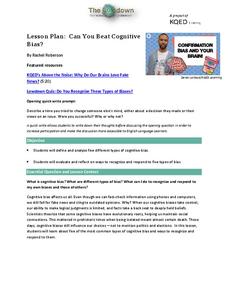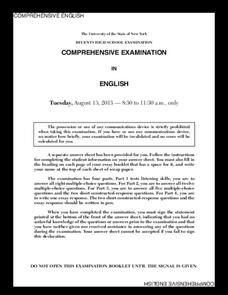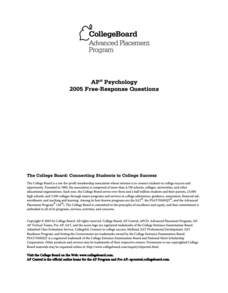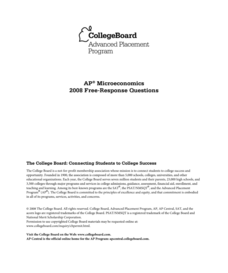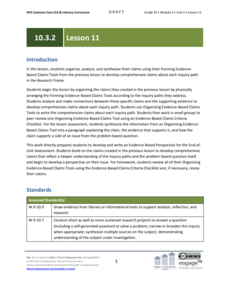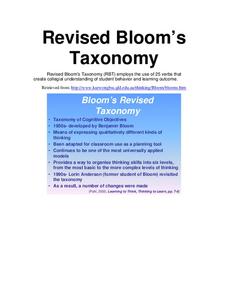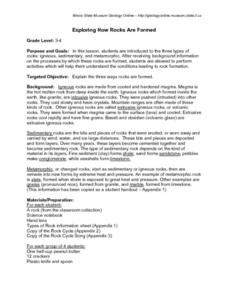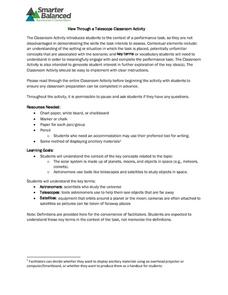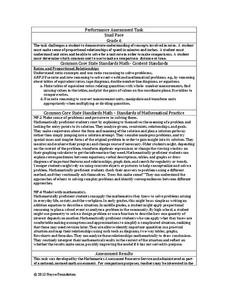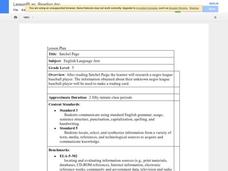EngageNY
Solve for Unknown Angles—Angles in a Triangle
Assist your class with each angle of geometry as they use exterior angles to form linear pairs with adjacent interior angles. They cover multiple vocabulary terms and work practice problems, complete with justifications, before taking an...
EngageNY
Grade 9 ELA Module 2: Unit 1, Lesson 13
Whether the planks hide the beating of a hideous heart or they break away to the madness beneath, their presence makes itself known in the final instructional activity of a literary analysis unit. Having gathered textual evidence from...
EngageNY
Grade 9 ELA Module 2, Unit 2, Lesson 19
Now that readers can see the full scope of Sophocles' Oedipus the King, they can draw connections between the dramatic ending and the textual evidence throughout the Greek tragedy. As they prepare for the unit assessment writing prompt,...
Curated OER
Osmosis and Dialysis
How do you engage pupils in a discussion about osmosis without leaving them overwhelmed? By providing them with the tools to perform an exciting experiment, and they will see osmosis in action! Young chemists and biologists use a potato...
NPR
Can You Beat Cognitive Bias?
In a time of fake news, media manipulation, and Internet trolls, a resource equips learners with the tools they need to recognize and combat resources that are designed to appeal to our cognitive biases. Introduce learners to five...
New York State Education Department
Comprehensive English Examination: August 2013
Individuals exercise their minds by taking the Comprehensive Examination in English, which assesses listening and reading comprehension and writing aptitude. Scholars answer multiple-choice questions and write two short-response essays....
National Constitution Center
Federalism, the Commerce Clause, and the Tenth Amendment
How do the state and federal governments relate to each other? The Constitution has a lot to say about that! Using an interactive online tool, pupils explore the Tenth Amendment. They apply their knowledge to political cartoons and news...
College Board
2003 AP® Psychology Free-Response Questions
Intelligence testing can be a useful tool—but what are its limits? Scholars explore the question, considering issues such as the role of bias, using authentic College Board materials. Learners also examine the psychological factors...
College Board
2005 AP® Psychology Free-Response Questions
How can diagnostic labels help children? Is hypnosis a useful tool or a fraudulent practice? An examination prompt explores controversies in psychology. A second, structured inquiry unpacks perception—and its various influences.
College Board
2008 AP® Microeconomics Free-Response Questions
The government can tweak the economy through a variety of tools. What are their long- and short-term effects? A problem set from College Board examines how the government sometimes pulls the strings to control the economy.
EngageNY
Grade 10 ELA Module 3: Unit 2, Lesson 11
It's time to prove it! Scholars now must ensure that all claims are based on evidence. Learners write detailed claims for each inquiry path using several evidence-based claims tools. At the end of the lesson plan, pupils respond to a...
EngageNY
Grade 10 ELA Module 3: Unit 2, Lesson 1
Scholars work through an investigation process to narrow down a question to research. Learners begin by examining the research process, creating a portfolio, and vetting two or three possible topics. For extended work, they search for...
EngageNY
Grade 10 ELA Module 3: Unit 3, Lesson 11
It's time to show what you know. Scholars finalize their argumentative essays by making last-minute revisions to conventions, tone, and formal style. Learners review the checklist to ensure they have met all the task requirements. They...
EngageNY
Grade 11 ELA Module 2: Unit 1, Lesson 3
Go figure! Scholars examine the figurative language in the last half of W.E.B. Du Bois's work "Of Our Spiritual Strivings." They pay special attention to his metaphors and develop ideas with group discussion and guided questions....
EngageNY
Grade 11 ELA Module 2: Unit 1, Lesson 14
Leave the past in the past. Scholars read paragraph 12 of the chapter "Of Our Spiritual Strivings" to analyze Du Bois's development of gaining liberty and leaving the ideas of the past. Pupils then carry out a three to five-minute...
National Endowment for the Humanities
From Courage to Freedom: The Reality behind the Song
Learners study how Frederick Douglass uses language to describe a realistic picture of slavery in his writings which are primary source documents. They examine his use of word choice, imagery, irony, and rhetorical appeals and use slave...
ReadWriteThink
Literature Circles: Getting Started
Make reading more enjoyable and interactive with literature circles! Here you'll find detailed lessons to begin the literature circle process. Ten lessons introduce each role learners take on. Literature circle roles include...
Universiti Tunku Abdul Rahman
Revised Bloom’s Taxonomy
For decades Bloom's Taxonomy has helped to guide educators' approach to instruction, but as times change and students change, so too must the methods for teaching evolve. Introducing teachers to the new revised Bloom's Taxonomy, this...
Curated OER
Exploring How Rocks Are Formed
These lessons produced by the Illinois State Museum are quite good. In this one, third and fourth graders are introduced to the three basic types of rocks: igneous, sedimentary, and metamorphic. They perform activities which help them...
Smarter Balanced
View Through a Telescope
Preparing for an assessment? Here's an activity that will ensure that all class members have the background knowledge they need to demonstrate their skills on a performance task related to the solar system and the tools astronomers use...
Noyce Foundation
Snail Pace
Slow and steady wins the race? In the assessment task, scholars calculate the rates at which different snails travel in order to find the fastest snail. Hopefully, your class will move much more quickly in finishing the task!
Curated OER
Satchel Page
Bring a instructional activity about Negro League Baseball to your Black history unit, or any other research unit throughout the year. While the lesson plan itself is simplistic, there are several good ideas that you could use, such as...
Smarter Balanced
Environmental Interdependence (Environmental Awareness)
Whether introducing a study of environment awareness or preparing your classes for a performance task related to environmental interdependence, you will find this resource useful. Key terms and concepts are introduced so that all...
Smarter Balanced
Growth and Expansion of America
Despite the difficulty of travel, the US expanded significantly between the 1800s and the early 1900s. To prepare for a performance task assessment on the rapid expansion of the US in the 1800s, class members engage in a write-pair-share...
Other popular searches
- Self Assessment Tools
- Music Assessment Tools
- Assessment Tools for Science
- Assessment Tools Coins
- Assessment Tools for Math
- Assessment Tools for Music
- Assessment Tools Singing
- Assessment Tools Lesson Plan
- Self Assessment Tools
- Assessment Tools + Coins






